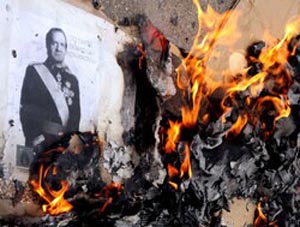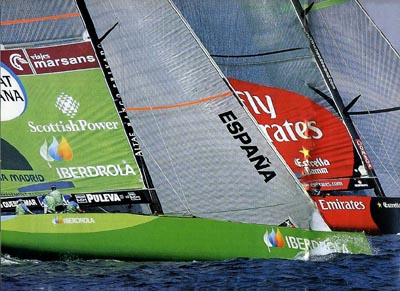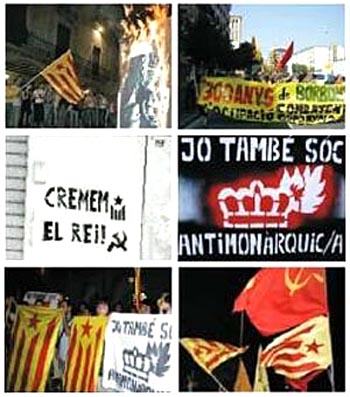 |
NEWS: November 13, 2007
Bird’s Eye View of the News
Atila Sinke Guimarães
AN EARTHQUAKE SHAKING THE SPANISH MONARCHY - “I also burn the Monarchy!” was the slogan being shouted in Barcelona and all of Catalonia by the separatist movement of that province at recent demonstrations. It was not only shouted, but followed by the actual burning of pictures of King Juan Carlos and Queen Sophia, present day monarchs of Spain. It is the first time such an outburst has occurred in the 32 years (1975-2007) of the constitutional monarchy that was artificially restored by Dictator Francisco Franco.
The demonstrators who made these offenses in the city of Gerone on September 13, 2007 were taken into custody by the police, and the two main leaders – Jayme Roura and Enric Stern – members of the Republican Left of Catalonia, were sentenced to 15 months in prison. Far from resolving the problem, this response triggered more than 30 other similar manifestations.
At a session of the Spanish Senate, representatives of Catalonia asked that the King be stripped of his title of Supreme Head of the Armed Forces, which produced another seism.

The effigy of the King burned in Barcelona |
In a parallel protest, Catholic radio Cope, supposedly of the right, accused Juan Carlos of favoring the socialists and asked the King to abdicate in favor of his son Prince Felipe in order to save the Monarchy. Here are the words of the broadcast: “The Sovereign is in tune with the socialists, and not at ease with the right. The latter thinks that he betrayed it and no longer plays his role as moderator. The monarchy cannot be saved unless the King abdicates and the Prince assumes the function of arbiter. This would avert the separatist attempts” (Matias Cléry, “Quand l’Espagne brûle ses idoles,” Point de Vue, October 17, 2007, pp. 22-25).
So, from both the left and from the right, there are manifestations of dissatisfaction with the King.
Facing such broad-scale opposition, Juan Carlos made a speech at the University of Oviedo on October 1, basically saying that “under the parliamentary monarchy, Spain has had its longest period of stability and prosperity in democracy.” These are very generic words without any special appeal to monarchic principles, but only presenting practical results.
As for the practical results, the field where Juan Carlos chose to spar, his words actually fall short of reality. Indeed, if we compare the reign of Juan Carlos as a monarch – where he plays only a symbolic role, as everyone knows – with the time when Francisco Franco effectively ruled Spain, we see that Franco’s 36 years in power also brought “stability and prosperity” to the country. His words are blatantly inappropriate when we go further back into Spain’s history and compare Juan Carlos 32-year term with the very effective 40-year-reign of Charles V (1516-1556) and the 42-year-reign of Philip II (1556-1598). In those two periods Spain knew the apex of her glory, influence and material prosperity.
So, King Juan Carlos said a little more than nothing in his speech defending the Spanish Monarchy.
Notwithstanding, after his talk, many voices from the center and center-left in the political spectrum raised up in favor of Juan Carlos. An editorial in Madrid’s ABC newspaper ran the headline, “With the King, with the Constitution.” Socialist prime minister José Zapatero described the debate on the abdication of the King as artificial and backed the King.
In summary, the adversaries of Juan Carlos on the left and the right have strong ideological platforms, the King made a weak defense, and the center rallied to his cause, but without enthusiasm. That is to say, the opposition is convinced of its ideals and decided to fight for them; the supporters are weak and lethargic. Such a situation raises serious concerns regarding the future of the Spanish Monarchy.

The King's participation in the hundred-million dollar race (his team is shown in green), raised unanimous disapproval - Point de Vue, May 23, 2007 |
For me, it appears clear that those symbolic manifestations in Catalonia trumpet a call for change. A banner was raised atop a mountain to be seen from afar.
The protests came one month after Juan Carlos and Felipe participated in a multi-hundred-million dollar yacht race along the Spanish coast near Valencia. The tonus of the party was given by international playboys such as the owner of Prada, the heir of Fiat, young members of the Louis Vuiton fashion house, French millionaire Antoine Arnault, Albert of Monaco, etc. The exorbitant expenses in such not-exemplary company raised all kinds of criticism.
Will we have the abdication of Juan Carlos and the ascension of an immature Prince Felipe to the Crown? Will Catholic Spain accept as its queen a divorced Letizia, whose previous modern lifestyle may not be untainted by scandal?
If it will, the new royal couple will be an easy target for the enemies of monarchy. If it won’t, we will still have the contradiction of a King who admires Socialism and is supported by socialists. A contradiction amplified by the bourgeois jet-set lifestyle adopted by the King and his family.
Asked about the situation of the monarchy, journalist Jaime Penafel, specialist on the topic for the newspaper El Mundo, said that he thought Juan Carlos had made a mistake by responding to those who attacked him. According to Penafel, the defense of the King should come from the Spanish people and the government. His advice to the King and royal family to ride through the storm is simple: They should take up their role of being models for the Spanish people and refrain from the recent “frivolities” in their vacations (ibidem).

Manifestations against the monarchy all over Catalonia |
From time immemorial Spain was a monarchy until 1931, when King Alfonso XIII was deposed and an ephemeral republic – supported by communist and socialists – took power. In 1936 Spain entered into Civil War: on the one side were monarchists and rightists (franquistas) fighting for the old order; on the other side were republicans, communists and socialists combating for the abolition of monarchy. In 1939 the monarchist-right coalition won the war, and General Francisco Franco declared himself dictator. At the end of 36 years of controlling Spain, Franco re-established the monarchy, disregarding the rights of the legitimate heir, the Count of Barcelona, father of Juan Carlos.
During this long period, a cultural revolution took place. With his hipertrophic promotion of tourism, Franco did what he could to destroy the Catholic Spanish mentality of days past. The Spain of heroism and sacrifice was replaced by the Spain of mediocrity and the good life – Sancho Panza triumphed over Don Quixote. In preparation for the future, Franco formed Juan Carlos to be a kind of centaur, half-monarchist and half-republican, in order to placate both sides. So far, Juan Carlos has played his role well, maintaining the façade of a monarchy in a republican-socialist reality.
It seems that today the Secret Forces are checking whether the Spanish people are ready to live without a king, and march on the same path as the other European republics, which, at different paces, are moving toward the One World Order: a necessarily socialist regime.
This seems to me the background of what is being decided in Spain today. The King has already committed all the mistakes to ignite a rebellion; the fuse of this rebellion was already lighted in Catalonia. Let us wait and see whether the King will be set aside, be replaced by Prince Felipe, or allotted some extra time to continue his task of anesthetizing Spain from a counter-revolutionary return to her Catholic past. The future will show us the direction the Secret Forces will take.
Unfortunately, given our lack of means, we are unable to do anything else but analyze the events.


Related Topics of Interest
 King Juan Carlos Dishonors the Golden Fleece King Juan Carlos Dishonors the Golden Fleece
 The Spanish Shame The Spanish Shame
 Don Pelayo and Our Lady of Covadonga Don Pelayo and Our Lady of Covadonga
 St. Callistus and the Spanish Reconquista St. Callistus and the Spanish Reconquista
 The Order of St. James of the Sword The Order of St. James of the Sword
 Remember Lepanto Remember Lepanto
 Vocations of the European Peoples Vocations of the European Peoples


|
News | Home | Books | CDs | Search | Contact Us | Donate

©2002- Tradition in Action, Inc. All Rights Reserved
|
 |
|